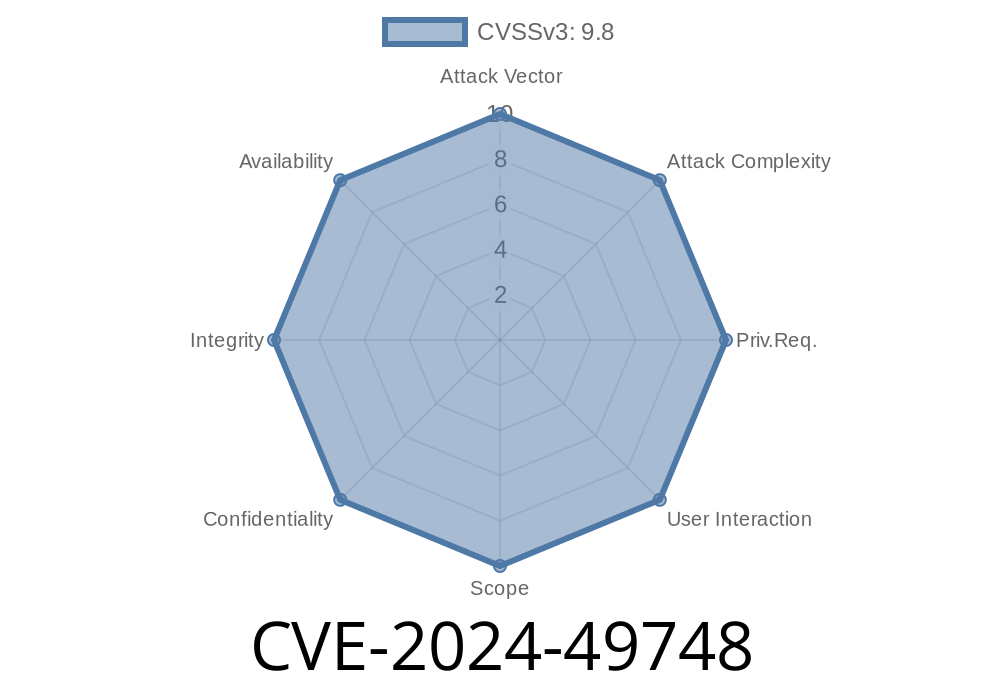CVE-2024-49748 is a newly reported security vulnerability affecting the Bluetooth stack in certain Android and Linux systems using the GATT (Generic Attribute Profile) server implementation. More specifically, the problem lies in the function gatts_process_primary_service_req in the gatt_sr.cc file. The flaw allows a remote attacker within Bluetooth range to potentially trigger a heap buffer overflow and execute arbitrary code – all without any need for user interaction or special privileges.
In this post, I'll break down how the bug works, show simplified code snippets to illustrate the issue, and explain why it's a serious problem. If you're interested in technical details and how attackers might exploit this, keep reading.
What is GATT and gatt_sr.cc?
Bluetooth Low Energy (BLE) uses GATT to define how two devices exchange data. A GATT server maintains a set of attributes (such as device name, capabilities, etc.) and responds to requests from a GATT client. The code to handle these server-side operations lives in files like gatt_sr.cc in major Bluetooth stacks (for instance, in AOSP's Bluedroid and Linux BlueZ).
One of the requests a client can make is to ask about primary services. This is handled by a function like gatts_process_primary_service_req.
What Went Wrong?
There’s a heap buffer overflow in the way gatts_process_primary_service_req parses certain malformed requests from clients. Simply put, the code does not properly check the size of incoming data before writing it into a memory buffer, which can cause it to overwrite adjacent memory locations ("overflowing the heap").
Attackers who are within Bluetooth range can craft a special BLE packet that triggers this bug, resulting in arbitrary code execution with the same privilege as the Bluetooth daemon.
Privilege: Bluetooth system process has significant privilege and access.
- Impact: Could lead to entire device compromise or be used as a base for further attacks (like privilege escalation).
Below is a *simplified and illustrative* snippet inspired by the handling in gatt_sr.cc
void gatts_process_primary_service_req(uint8_t* data, size_t len) {
// Suppose the request specifies how many attributes it wants to read
uint16_t req_count = data[1]; // Read count from request packet
// Heap buffer allocated to store results
uint8_t* buf = (uint8_t*)malloc(req_count * ENTRY_SIZE);
// The code does not check if req_count is larger than what fits in the input
for (size_t i = ; i < req_count; ++i) {
// Writing to buf, possibly exceeding the allocated size!
buf[i * ENTRY_SIZE] = ... // <-- Out-of-bounds write if req_count too large
}
// ... send response ...
free(buf);
}
The actual bug boils down to trusting the client's declared req_count or similar field, without checking that the request is sized correctly or even sensibly.
Reconnaissance: The attacker scans for Bluetooth-enabled devices within range.
- Craft Malformed Packet: They send a Read By Group Type Request or similar, with a huge count value (larger than what the device normally handles).
- Trigger Overflow: The server receives the request, allocates a buffer of size count, and writes into it, overflowing into adjacent memory.
- Gain Control: Carefully crafted overflow may overwrite function pointers, return addresses, or other critical data on the heap, leading to arbitrary code execution.
*Note:* No pairing or authentication is necessarily needed, unless the device requires pairing for service discovery.
Mitigation & Fix
- Upstream Patch: The fix is to check the limits of incoming data lengths and counts, ensuring you never allocate or write beyond what is safe.
- Vendor Updates: Check with your device manufacturer or Linux distribution for patches. As of June 2024, updates are rolling out for Android and major Linux Bluetooth stacks.
Example Patch (Pseudocode)
// Add proper bounds-check!
if (req_count > MAX_ALLOWED_COUNT || len < (req_count * REQUEST_ENTRY_SIZE)) {
// Reject the request as invalid
return;
}
References
- Openwall CVE-2024-49748
- Google Security Bulletin June 2024
- Bluetooth SIG Security Notices
Conclusion
CVE-2024-49748 is yet another reminder that trusting user input–especially in "invisible" system-level protocols like Bluetooth–can lead to serious security bugs. This heap buffer overflow can let attackers run their code on your device just by being nearby, even if you never interact with them.
Best practices:
Prefer devices and OS versions with security updates.
Stay safe, stay patched, and don’t trust unchecked input—even over Bluetooth!
*This explanation and code are for educational purposes only. Running or attempting to exploit this bug without explicit permission is illegal and unethical.*
Timeline
Published on: 01/21/2025 23:15:15 UTC
Last modified on: 03/17/2025 16:15:23 UTC
